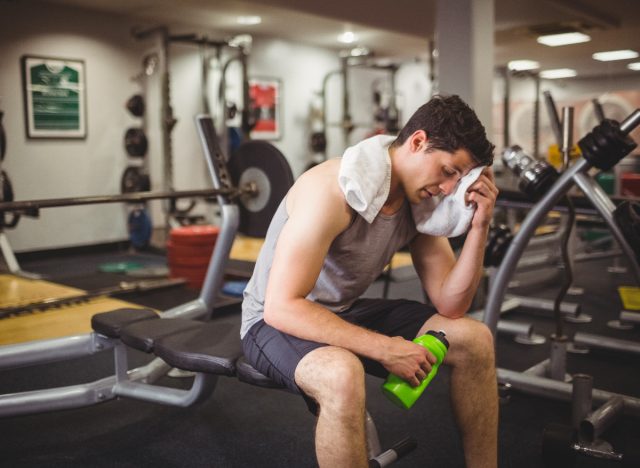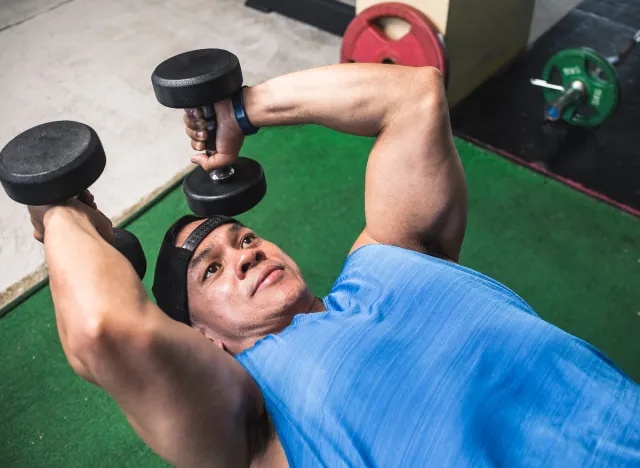Fitness is an essential component of a healthy and fulfilling life. However, not all fitness habits are created equal. Some practices that are touted as healthy may be doing more harm than good. Whether it’s due to misinformation or lack of awareness, these habits can negatively affect your physical health and well-being. We chatted with Kate Meier, CPT, a certified personal trainer with Garage Gym Reviews, who explores some common fitness habits that destroy your body before 50. From not stretching properly to overdoing it with cardio, we’ll dive into each habit, examine why it’s problematic, and offer alternatives to help you correct your routine.
These habits can cause long-term damage to your body, regardless of your age. That’s because your body becomes less resilient as you get older, and the effects of these habits can have a more significant impact. By identifying and correcting these habits early on, you can help ensure that your body stays strong and healthy for years to come.
So, whether you’re in your 20s, 30s, 40s, or beyond, it’s never too early to start paying attention to your fitness habits and making positive changes. Doing so will give you the best chance to enjoy a happy and fulfilling life well into your later years.
Whether you’re a seasoned athlete or just starting, read on to discover which fitness habits destroy your body. This way, you know what to avoid, which will help ensure you’re on the path to optimal physical health. And when you’re done, check out these 7 Bad Habits That Are Killing Your Workout Progress.
1. You’re overtraining.


Exercise is essential for a healthy lifestyle, but overtraining can lead to exhaustion, injuries, and poor performance, the Hospital for Special Surgery (HSS) reports. That’s why listening to your body and giving it the rest it needs is critical.
“If you’re often fatigued during your workouts and outside the gym, you might be overtraining,” says Meier. “Over time, the symptoms of overtraining often get worse. Your muscles need ample time to recover between workouts, so if you train hard frequently and only allow a day or two of rest per week, you could be at risk of this common but often ignored issue.”
2. You’re neglecting stretching.
Stretching helps to improve flexibility, prevent injuries, and boost your physical performance, according to the Mayo Clinic. However, neglecting this crucial fitness component can lead to stiff joints and limited mobility.
“A stretching routine is vital to improving your fitness and decreasing your risk of injury. It helps get the blood flowing to your muscles to aid recovery, and it helps improve your range of motion throughout virtually every exercise you do in the gym, as well as daily activities,” says Meier. “When you neglect to stretch, you may limit your range of motion and increase your chances of getting hurt.”
3. You’re ignoring certain muscle groups.
“Depending on your training type, your workouts may focus on individual muscle groups or total-body fitness. Especially if your training style is the former, it’s essential to make sure you don’t forget about certain muscle groups as you plan your training—including those that aren’t your favorite to train,” says Meier.
Working all muscle groups evenly is essential because prioritizing certain muscle groups can create muscular imbalances and increase your injury risk.
4. You’re pushing through pain.


Pain is your body’s way of telling you that something is wrong. Ignoring it can lead to serious injuries that can take months or even years to heal.
“The ‘no pain, no gain’ mentality is ever-present in the fitness world, but if you feel pain outside of typical soreness after a workout, it should always be a cause for concern—and a doctor’s visit. Continually pushing through pain during your workouts instead of taking time to recover will do more harm than good, especially if the cause is an undiagnosed injury,” Meier explains.
READ RELATED: Pros and Cons of Consuming Canned Foods During Pregnancy
5. You’re only doing cardio.
While cardio is important for cardiovascular health, strength training should also be a top priority. According to ACE Fitness, resistance training is directly associated with muscle mass, making it a major key to maintaining a fast metabolism. Not performing strength exercises can result in muscle loss.
“Cardiovascular exercise is an important part of any fitness regimen, but if you overdo it with cardio or do one cardio method cardio exclusively, this can increase your chance of overuse injuries,” says Meier. “Because typical cardio methods like running and rowing are repetitive, it’s important to do strength work and stretching to ensure your muscles stay balanced over time.”
6. You’re prioritizing weight over good form.
“Lifting with poor form is a surefire way to end up with injuries. As we age, joint health becomes more important than ever, and the movement patterns you develop early on will carry over as the years go on. So even if it doesn’t lead to injury at the moment, getting your body used to poor lifting form can catch up to you once your muscle mass and joints aren’t what they were in your 20s,” says Meier.
Lifting heavy weights may look impressive, but prioritizing weight over proper form can lead to injuries, muscle imbalances, and damage to your joints.
7. You’re not sleeping enough.
Sleep is essential for performance, recovery, and overall health. According to the Sleep Foundation, not getting enough shuteye regularly can lead to decreased physical performance, overeating, weight gain, and increased injury risk.
“Good sleep and good health go hand in hand, and having a consistent sleep schedule over time is something virtually any trainer or health professional will recommend,” states Meier. “Not only does good sleep benefit your muscles to help them recover, but it also improves your overall health as you age.”
8. You’re forcing uncomfortable movements.


“Similar to having bad form, doing exercises that work for other people, even if they don’t feel right to you, is something you should avoid,” Meier explains. “Just because a specific movement works wonders for someone else doesn’t mean your body is built the same way. You’re better off sticking to movements that feel good to your muscles and joints to prevent excessive wear and tear or injuries.”
While challenging yourself is important, forcing uncomfortable movements can result in injuries and long-term damage.
9. You’re never switching up your strength training.
Your body quickly adapts to routine, and doing the same exercises daily can cause plateaus in your progress. That’s why switching up your fitness routine regularly is essential to keep progressing and avoid injury.
“Training the same way week in and week out can lead to fitness plateaus, making you more susceptible to overtraining or overuse injuries over time. Make sure to switch up your workouts every few weeks, and try new training styles occasionally to get your muscles moving in different ways,” advises Meier.
Source:








